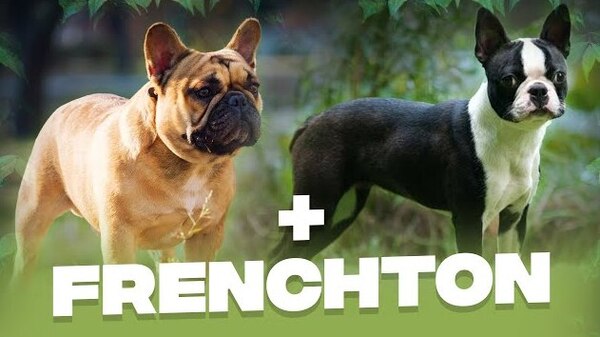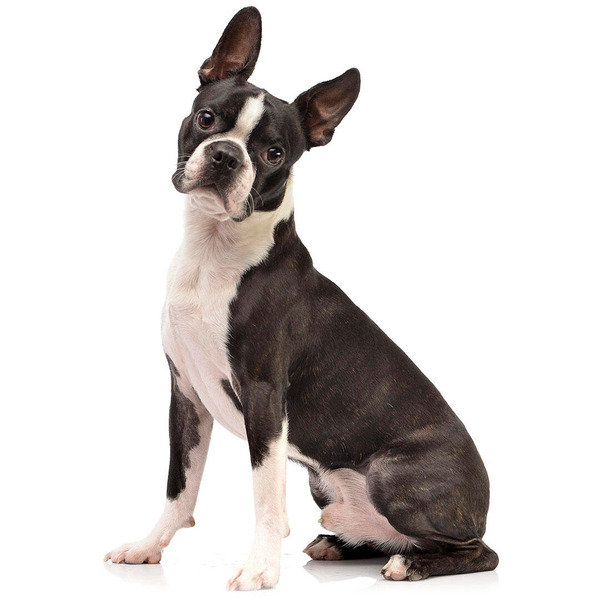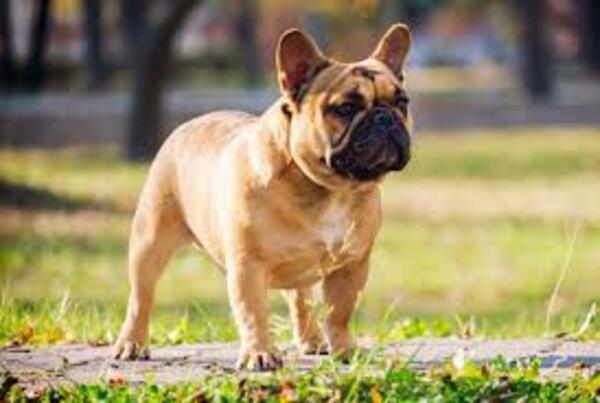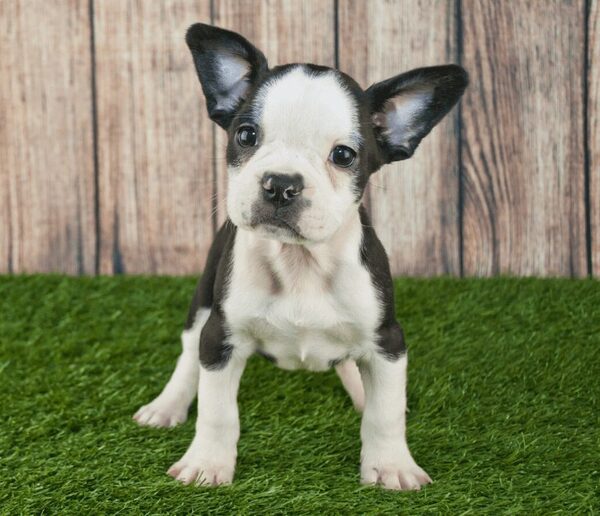The Boston Terrier French Bulldog mix, often called a "Frenchton," is a delightful hybrid breed that combines the charming characteristics of both parent breeds: the Boston Terrier and the French Bulldog. This mix has gained popularity for its playful nature, affectionate temperament, and unique appearance. In this article, we’ll explore what makes this mixed breed special, its physical traits, personality, care requirements, and more.

A Boston Terrier French Bulldog mix is the result of breeding a Boston Terrier (known for its friendly demeanor and distinctive tuxedo coat) with a French Bulldog (famous for its bat-like ears and muscular build). This hybrid combines the best traits of both breeds, resulting in a small, compact dog that is both lovable and spirited.
The Boston Terrier is a charming and popular breed known for its friendly demeanor and distinctive appearance. Often referred to as the "American Gentleman" due to its tuxedo-like coat, the Boston Terrier is a small, intelligent, and adaptable dog that makes an excellent companion for individuals and families alike. In this article, we’ll explore the history, physical characteristics, temperament, care requirements, and health considerations of this delightful breed.

The Boston Terrier originated in the late 19th century in Boston, Massachusetts. The breed was developed by crossing the now-extinct English Bulldog with the English Terrier, primarily for the purpose of creating a small, friendly companion dog. The breed was recognized by the American Kennel Club (AKC) in 1893, and it quickly gained popularity in the United States and beyond.
Coat: They have a short, smooth coat that is easy to maintain. The coat color is usually a combination of black, brindle, or seal, with white markings that give them their distinctive tuxedo look.
Face and Ears: Boston Terriers have a square-shaped head with a short muzzle and large, expressive eyes. Their ears are typically erect and can be either cropped or left natural, adding to their endearing appearance.
Friendly and Sociable: Boston Terriers are known for their friendly nature. They are affectionate, playful, and generally get along well with children and other pets.
Intelligent and Trainable: This breed is intelligent and eager to please, making them relatively easy to train. They respond well to positive reinforcement methods, such as treats and praise.
Playful and Energetic: Boston Terriers have a playful spirit and enjoy engaging in various activities with their owners. While they have bursts of energy, they also enjoy lounging around, making them adaptable to different lifestyles.
Alert and Protective: Despite their small size, Boston Terriers can be quite alert and protective of their families. They may bark to alert their owners of strangers, but they are not typically aggressive.
Exercise: Boston Terriers require regular exercise to stay healthy and happy. Short walks and playtime are usually sufficient, aiming for about 30 minutes of activity each day.
Grooming: Their short coat requires minimal grooming. Regular brushing helps reduce shedding and keeps their coat looking shiny. Bathing should be done as needed.
Nutrition: A balanced diet is essential for maintaining the health of a Boston Terrier. High-quality dog food that meets their nutritional needs should be provided, and portion control is important to prevent obesity.
Like all breeds, Boston Terriers are prone to specific health issues. Some common health concerns include:
Brachycephalic Airway Syndrome: Due to their short muzzles, Boston Terriers can experience breathing difficulties, especially in hot or humid weather. It’s important to monitor their breathing and avoid strenuous exercise in extreme conditions.
Eye Issues: They may be prone to certain eye conditions, including cataracts and corneal ulcers, which can require veterinary attention.
Joint Problems: Boston Terriers can also be susceptible to joint issues, such as hip dysplasia and patellar luxation.
Regular veterinary check-ups are essential to monitor their health and address any concerns early on.
The Boston Terrier is a delightful breed known for its friendly disposition, charming appearance, and adaptability. Whether you’re looking for a playful companion or a loving family pet, the Boston Terrier is sure to bring joy and companionship to your life. With proper care, training, and attention to their health needs, these lovable dogs can thrive and become cherished members of your family.
The French Bulldog, affectionately known as the "Frenchie," is a small breed that has captured the hearts of dog lovers around the world. With its distinctive bat-like ears, compact body, and charming personality, the French Bulldog is a popular companion dog. In this article, we’ll delve into the breed's history, physical characteristics, temperament, care requirements, and health considerations.

The French Bulldog originated in England in the 19th century, where it was developed as a smaller version of the English Bulldog. As lace workers moved to France during the Industrial Revolution, they brought their small Bulldogs with them, which began to gain popularity among the French. The breed was officially recognized in France, and by the late 1800s, the French Bulldog had become a beloved companion dog. It was recognized by the American Kennel Club (AKC) in 1898.
Size: French Bulldogs are small, muscular dogs, typically weighing between 16 to 28 pounds and standing about 11 to 12 inches tall at the shoulder. Their sturdy build gives them a robust appearance.
Coat: They have a short, smooth coat that is easy to maintain. The coat can come in a variety of colors, including brindle, fawn, white, and combinations of these.
Face and Ears: One of the most recognizable features of the French Bulldog is its flat, squashed face and large, bat-like ears. Their expressive eyes and distinctive face shape add to their charm.
Affectionate and Loyal: French Bulldogs are known for their affectionate nature. They bond closely with their families and often seek out attention and companionship.
Playful and Energetic: Despite their small size, Frenchies are playful and enjoy engaging in activities with their owners. They have bursts of energy and love to play, but they also appreciate lounging around.
Intelligent and Stubborn: French Bulldogs are intelligent, but they can also be a bit stubborn. Training may require patience, and positive reinforcement methods work best.
Sociable: Frenchies are generally friendly and sociable with people and other pets. Early socialization is essential to help them develop into well-adjusted adults.
Exercise: French Bulldogs need regular exercise to maintain a healthy weight and avoid boredom. Short walks and play sessions are typically sufficient, aiming for about 30 minutes of activity each day.
Grooming: Their short coat requires minimal grooming. Regular brushing helps reduce shedding, and baths should be given as needed. Pay attention to the wrinkles on their face to prevent moisture buildup, which can lead to skin issues.
Nutrition: A balanced diet is crucial for a French Bulldog’s health. High-quality dog food tailored to their size and activity level should be provided, along with appropriate portion control to prevent obesity.
Like all breeds, French Bulldogs are prone to specific health issues. Some common health concerns include:
Brachycephalic Airway Syndrome: Due to their short muzzle, French Bulldogs often experience breathing difficulties, especially in hot or humid conditions. It's important to monitor their breathing and avoid strenuous exercise in extreme weather.
Hip Dysplasia: This genetic condition affects the hip joints and can lead to arthritis and mobility issues. Regular veterinary check-ups can help manage any signs of hip dysplasia.
Skin Problems: Frenchies can be prone to skin issues, especially in the folds of their skin. Regular cleaning and care for these areas are important to prevent infections.
The French Bulldog is a delightful breed known for its affectionate personality, distinctive appearance, and adaptability. Whether you’re looking for a playful companion or a loving family pet, the French Bulldog is sure to bring joy to your home. With proper care, training, and attention to their health needs, these charming dogs can thrive and become beloved members of your family.
Size: Frenchtons are typically small dogs, weighing between 15 to 25 pounds and standing about 12 to 16 inches tall at the shoulder. Their size makes them great companions for both individuals and families living in smaller spaces.
Coat: The coat of a Boston Terrier French Bulldog mix can vary, but it generally has a short, smooth texture. Colors can range from brindle, black, and fawn to a combination of these colors, often resembling the patterns found in both parent breeds.
Ears: One of the most recognizable features of this mix is its ears. They may be bat-like like a French Bulldog or have a more rounded shape like a Boston Terrier, adding to their adorable appearance.
Friendly and Affectionate: Boston Terrier French Bulldog mixes are known for their friendly nature. They are typically affectionate with their families and get along well with children and other pets.
Playful: These dogs have a playful spirit and enjoy engaging in fun activities with their owners. Whether it’s a game of fetch or a brisk walk, they love to stay active.
Intelligent: Both parent breeds are intelligent, which means Frenchtons are usually quick learners. They respond well to training, especially when rewarded with treats and praise.
Sociable: Frenchtons tend to be social dogs that enjoy meeting new people. Early socialization is important to ensure they are well-adjusted and confident around strangers.
Exercise: While they don’t require extensive exercise, regular walks and playtime are essential to keep them healthy and happy. Aim for at least 30 minutes of activity each day.
Grooming: Their short coat makes grooming relatively easy. Regular brushing helps reduce shedding and keeps their coat looking shiny. They are generally low-maintenance when it comes to grooming.
Health Considerations: Like all breeds, Frenchtons can be prone to specific health issues. Due to their brachycephalic (short-nosed) structure, they may experience breathing difficulties, especially in hot or humid weather. Regular veterinary check-ups are essential to monitor their health.
Positive Reinforcement: Use positive reinforcement techniques, such as treats and praise, to encourage good behavior. This method helps strengthen the bond between you and your dog.
Socialization: Introduce your Frenchton to different environments, people, and pets early on to help them develop into well-rounded adults.
Consistency: Be consistent with commands and routines to help your dog learn more effectively. This consistency will make training smoother and more successful.

The Boston Terrier French Bulldog mix, or Frenchton, is a charming and affectionate hybrid that makes a wonderful companion for many households. With their friendly disposition, playful nature, and manageable care requirements, they are well-suited for various living situations. If you’re considering adding a Frenchton to your family, be prepared for a loving and lively addition that will bring joy to your home!
When it comes to small companion dogs, Boston Terriers, French Bulldogs, and their mix—often called the Boston Bulldog—are popular choices. Each breed has unique characteristics that appeal to different types of dog owners. In this article, we'll compare these three breeds based on various attributes, including temperament, aggression, friendliness, suitability as pets, and more. A comparative table will help highlight their differences.
| Attribute | Boston Terrier | French Bulldog | Boston Terrier French Bulldog Mix |
|---|---|---|---|
| Size | 10-25 lbs | 16-28 lbs | 15-25 lbs |
| Height | 12-17 inches | 11-12 inches | 11-15 inches |
| Coat | Short, smooth | Short, smooth | Short, smooth |
| Temperament | Friendly, energetic | Affectionate, playful | Balanced, friendly |
| Aggression Level | Low to moderate | Low | Low to moderate |
| Friendliness | Very friendly with people | Very friendly, good with kids | Generally friendly |
| Trainability | High, responds well to training | Moderate, can be stubborn | Moderate |
| Exercise Needs | Moderate, enjoys playtime | Low to moderate | Moderate |
| Adaptability | Highly adaptable | Adaptable, but sensitive to heat | Highly adaptable |
| Grooming Needs | Low | Low | Low |
| Health Issues | Brachycephalic issues, eye problems | Brachycephalic issues, hip dysplasia | Similar to both parents |
Boston Terrier: Known for their friendly and energetic nature, Boston Terriers are playful, affectionate, and good with children. They tend to bond closely with their families.
French Bulldog: French Bulldogs are also affectionate and known for their laid-back personalities. They are playful and enjoy human companionship, making them great family pets.
Boston Terrier French Bulldog Mix: This mix often inherits the best traits from both breeds. They are generally friendly and sociable, striking a balance between the playful nature of the Boston Terrier and the affectionate demeanor of the French Bulldog.
Boston Terrier: Generally, Boston Terriers are not aggressive and are more likely to bark to alert their owners about something unusual rather than being confrontational.
French Bulldog: French Bulldogs are also not aggressive. They are known for their easygoing temperament and typically get along well with other pets and children.
Boston Terrier French Bulldog Mix: This mix usually has a low aggression level, making it a good choice for families and homes with other pets.
Boston Terrier: Extremely friendly, Boston Terriers love to be around people and are great with children and other pets.
French Bulldog: French Bulldogs are very friendly and can be excellent companions for children, often being described as loving and gentle.
Boston Terrier French Bulldog Mix: The mix tends to be friendly and sociable, enjoying interaction with family members and often getting along well with other animals.
Boston Terrier: This breed is highly adaptable and does well in various living situations, including apartments. They require moderate exercise and thrive on human interaction.
French Bulldog: Frenchies are also suitable for apartment living but can be sensitive to heat due to their brachycephalic nature. They have lower exercise needs, making them great for less active households.
Boston Terrier French Bulldog Mix: The mix combines the adaptability of the Boston Terrier with the French Bulldog's easygoing nature, making it suitable for a variety of living situations and families.
Boston Terrier: They can be prone to respiratory issues due to their short muzzle, as well as eye problems.
French Bulldog: Similar to Boston Terriers, French Bulldogs face risks related to their brachycephalic structure, including breathing difficulties and potential hip dysplasia.
Boston Terrier French Bulldog Mix: This mix may inherit health issues from either parent, so regular veterinary care and monitoring are essential.
Choosing between a Boston Terrier, a French Bulldog, or a Boston Terrier French Bulldog mix ultimately depends on your lifestyle and preferences. Each breed has its unique characteristics, but all three are known for their friendly nature and suitability as companion animals. Whether you prefer the energetic playfulness of the Boston Terrier, the affectionate calmness of the French Bulldog, or a blend of both in the mix, any of these breeds can bring joy and companionship to your life.
animal tags: French-Bulldog
We created this article in conjunction with AI technology, then made sure it was fact-checked and edited by a Animals Top editor.